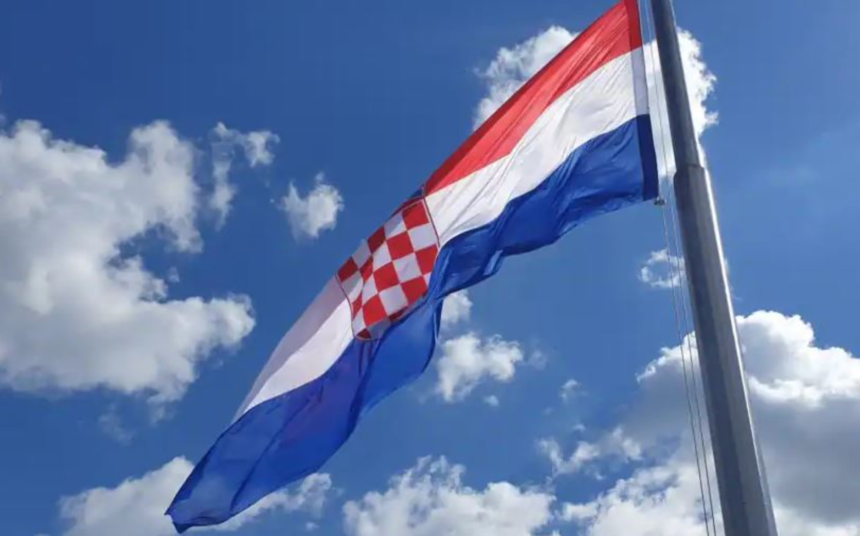The initiative between Kosovo, Albania, and Croatia for cooperation in the field of security and defense “is also open to allies and partners of the European Union and NATO” who “wish to contribute to building stability, security, and resilience in the Southeastern European region.”
This is how the Government of Croatia commented on the Declaration signed by the three countries on March 18.
According to the government, any countries that also wish to support Kosovo and Albania in their European and Euro-Atlantic path can join the initiative.
The goal of this initiative “is not the creation of any military alliance.”
“Such an alliance—apart from NATO membership—is not even necessary,” the Croatian Government emphasized in its written response to Radio Free Europe.
Unlike Albania and Croatia, Kosovo is not a member of NATO.
In his initial reactions to the initiative, Serbian President Aleksandar Vučić stated that with the signing of the document, Croatia, Albania, and Kosovo “have opened an arms race in the region” and “have violated the 1996 sub-regional agreement.”
This agreement, which concerns allowable arms quotas, was signed by two entities of Bosnia and Herzegovina—the Federation of Bosnia and Herzegovina and Republika Srpska—as well as Croatia and the Federal Republic of Yugoslavia, which consisted of Serbia and Montenegro.
In its statement to Radio Free Europe, the Croatian Government says that this agreement has been continuously applied for 29 years.
It also recalls that neither Albania nor Kosovo are parties to that agreement.
“In this context, it is completely pointless to link it with the recently signed Joint Declaration between Albania, Croatia, and Kosovo, the main goal of which is to strengthen cooperation between the defense ministries of friendly countries, partners, and allies,” the Croatian Government said in its response.
The Government and Ministry of Defense of Serbia did not respond to Radio Free Europe’s question about why they view the initiative of the three Balkan countries as a threat.
However, Daniel Serwer, a professor at Johns Hopkins University in the USA, says that the official Belgrade “knows very well” that NATO allies cannot act unilaterally against Serbia.
“Furthermore, the three countries mentioned do not pose any threat to Serbia,” Serwer told Radio Free Europe.
He views the Declaration of the three states as “a move that contributes to stability, not destabilization.”
He praises Kosovo for “wisely” forming a partnership with Albania and Croatia, which are NATO member states.
NATO also commented on the Declaration, calling it a trilateral agreement between the three countries.
“NATO, as an organization, is not part of the initiative, and therefore has not played a role in the consultation process,” NATO said in its response to Radio Free Europe.
Why Does Belgrade Oppose It?
Vuk Vuksanović, a researcher at the Belgrade-based non-governmental Center for Security Policy, says that officials in Belgrade are using the Declaration “to divert attention” from internal problems.
He alludes to the massive protests that have engulfed Serbia for over four months. The protesters, led by students, are demanding political and criminal accountability for the deaths of 16 people in the collapse of a shelter at the Novi Sad Railway Station last November.
Vuksanović says that Belgrade considers the participation of Zagreb as particularly “provocative.”
“I don’t think it has much to do with Albania, considering that Vučić has, or at least had, a quite cooperative relationship with Prime Minister Edi Rama,” he says.
However, Serbian Defense Minister Bratislav Gašić described the trilateral memorandum as “a provocative initiative from neighboring countries that goes against efforts to strengthen regional security.”
“Kosovo and Metohija is an autonomous province within the Republic of Serbia, regardless of the fact that some countries, including Albania and Croatia, have recognized its illegal and self-declared independence,” Gašić said.
Kosovo declared independence in 2008, but it is still not recognized by Serbia.
According to Gašić, Zagreb and Tirana have long been trying to bring Kosovo into NATO “through the back door.”
He also claims that these two countries are assisting in the development of the Kosovo Army, which Serbia considers illegal.
“Clearly, such a scenario is unacceptable for our country,” Gašić said.
What Does the Declaration Say?
The Declaration on cooperation in defense and security between Albania, Croatia, and Kosovo contains four points.
The first refers to promoting cooperation in the defense industry—to enhance military readiness.
The Declaration also talks about improving cooperation in the education and training of military personnel, in line with NATO and EU training policies and exercises.
One of the points in the Declaration involves the exchange of information and intelligence, as well as exploring the possibility of responding to a broad range of potential threats.
It also emphasizes alignment of policies and positions with those of Euro-Atlantic security institutions, as well as the obligation to cooperate and coordinate with the aim of Kosovo’s full integration into regional security initiatives.
What is the Legal Force of the Declaration?
Vuksanović says this is not a typical inter-state agreement under the rules of public international law.
“Memorandums of cooperation are not legally binding in nature,” he explains.
He stresses that this is a sub-regional agreement between two NATO members and a third party—Kosovo.
He views Croatia’s participation as an attempt to gain political points in the regional context.
Who Do Zagreb, Tirana, and Pristina See as a Threat?
In its response to Radio Free Europe, the Croatian Government emphasizes that cooperation in defense between Zagreb, Tirana, and Pristina is “high-quality” and that the Declaration aims only to improve that.
“The Southeastern European region is exposed to security threats, particularly those from hybrid and cyber domains, aimed at destabilizing the region,” the Declaration reads.
It does not specify where these threats are coming from.
Who is the “Factor of Peace and Stability” in the Region?
In addition to opposing the Declaration, Serbian officials have repeatedly stated that Belgrade remains committed to maintaining regional peace and stability.
Thus, Serbia’s Ministry of Defense has stated that, for this interest, it will continue to cooperate with NATO member states.
However, Professor Serwer says that the “only arms race” in the region is the one led by Serbia for years.
“Serbia is not a factor of peace and stability in the region. Vučić is simply deceiving naive diplomats,” he says.
Serwer adds that Belgrade continues to refuse to implement agreements with Kosovo and continues to support secessionist policies in Republika Srpska, led by Milorad Dodik.
He also notes that the government in Belgrade, which has not severed ties with the Kremlin even after Russia’s invasion of Ukraine, encourages pro-Russian policies in both Serbia and Montenegro.
“None of this contributes to peace and stability,” Serwer concludes.







